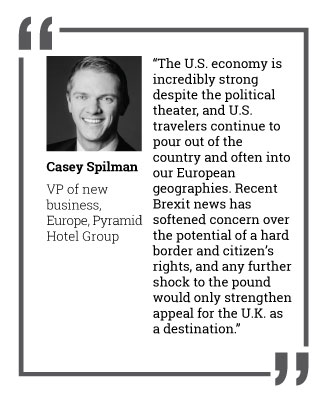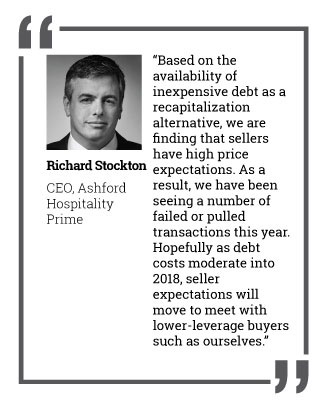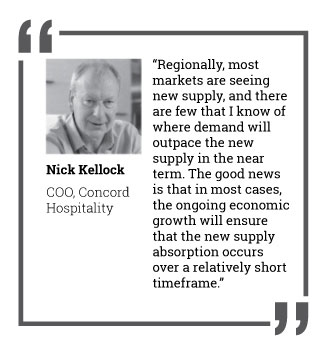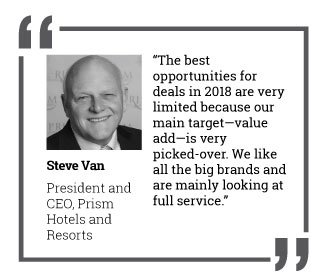✕

Column: industry Tag: Ashford Hospitality,supply,hotel transaction Published: 2018-01-05 15:23 Source: Author:

Ashford Hospitality Prime President and CEO Richard Stockton said the REIT expects the reopening of the Moscone Center to drive positive performance at the Courtyard San Francisco Downtown in 2018.
GLOBAL REPORT—As hotel owners, investors and developers look ahead to 2018, common concerns like increasing supply, the pace of transactions and labor issues permeate the industry.
Hotel News Now asked executives of several companies to share their perspectives on these hot-button topics as well as the other matters that are currently top of mind.
Supply and demand
STR, parent company of Hotel News Now, projects U.S. supply growth (+2%) will overtake demand growth (+1.9%) in 2018, according to the company’s November 2017 forecast, but average-daily-rate increases (+2.4%) should offset slight occupancy declines (-0.2%) and keep revenue per available room positive (+2.2%).
Ashford Hospitality Prime President and CEO Richard Stockton said his company’s assets should perform in line with expectations or even exceed them.
“For our portfolio, our markets are well-positioned relative to these dynamics, with expected supply growth in line with industrywide averages for next year,” Stockton said via email. “The most promising markets for our portfolio include Seattle, San Francisco and Washington, D.C. Additionally, due to the wildfire and hurricane disruptions this year, we also expect favorable year-over-year comparisons for our Napa Valley (Yountville) assets and Key West.”
These “market-specific trends,” like the recovery of markets affected by natural disasters in 2017, are what Stockton hopes will push Ashford Prime’s portfolio out in front in 2018.
“Specifically, we have the Courtyard San Francisco that will begin to benefit from the reopening of the Moscone Center,” he said. “We also expect to see tourism demand come back strongly in Key West and Napa Valley in 2018. Furthermore, with the rationalization of our non-core portfolio underway, and the acquisition of one or more new luxury assets, we expect to hit new levels of RevPAR far in excess of our lodging (real estate investment trust) peers.”
Concord Hospitality Enterprises COO Nick Kellock said he expects U.S. economic growth to continue, and that should ease supply concerns.
“Regionally, most markets are seeing new supply, and there are few that I know of where demand will outpace the new supply in the near term,” Kellock said via email. “The good news is that in most cases, the ongoing economic growth will ensure that the new supply absorption occurs over a relatively short timeframe.”
Regardless of new competition, a solid strategy to capture demand goes a long way toward maintaining business levels, Kellock said.
“To be honest, the approach does not really vary from what we would be executing against without new supply,” he said. “When applicable, it is always important to complete timely renovations to ensure our product remains competitive. This is all the more critical when new product is coming to the market. Aside from that, it is all about working the sales effort in our own backyard—building relationships, shifting business from competitors and then providing a great experience to ensure guests keep staying with us.”
Steve Van, CEO of Prism Hotels and Resorts, agreed that if you want to increase demand, your best option is to pry it away from competing properties.

“Sure, you can complain about supply growth, but capturing demand is as simple as taking it from someone else,” Van said via email. “We are maniacal about our war board program—systematically and strategically identifying the business in our area that fits our revenue and profit models, and arming our sales team with the knowledge, training and confidence to go out and get it. Yes, there are markets where the oversupply is affecting demand; however, as long as there are guests checking into our competitors, there is business out there to steal.”
There are also other factors, like delays in financing or planning, that can give owners and operators more time to develop a demand strategy, said Casey Spilman, VP of new business, Europe at Pyramid Hotel Group.
“With our current focus being in Ireland and the U.K., we continue to see significant operational opportunity in most markets,” Spilman said via email. “While supply is building momentum in some markets, in our view it can sometimes be more ominous on paper than in reality—meaning the battle for highest and best use, complications in development financing and planning risk can dampen and/or delay supply growth … this is obviously nuanced from one market to the next.”
Deals and target assets
On the transaction front, Spilman said Pyramid?executives expect to be net buyers in 2018. He added the company is focused on retention of third-party management contracts in the upcoming year.
Downtown and suburban locations remain the most attractive markets in the U.K. and Ireland for Pyramid and its capital partners, Spilman said, but assets in regions outside of major or secondary cities can also provide value.
“With more attractive yields and often equally robust business plans, there is good money to be made in some of these markets so long as the market’s demand profile offers enough to play with operationally, notwithstanding that each opportunity must be vetted on an individual basis,” he said. “We’re also selectively pursuing development deals in primary markets and hope to see those opportunities bear fruit in the next six to 12 months.”
Select-service and extended-stay properties are attractive development opportunities “given their lower build cost and higher profit margin,” Spilman said, but full-service options are still on the table, and brands are very hot in the region.
“Brands continue to present a significant opportunity in the U.K. and, even more so, in Ireland,” he said.
In 2017, Ashford Prime acquired the Park Hyatt Beaver Creek in Beaver Creek, Colorado, and the Hotel Yountville in Yountville, California, for a combined total of nearly $250 million. In November, it sold the Marriott Plano Legacy Town Center in Plano, Texas, for $104 million. Stockton said the company hopes to close on the sale of the Renaissance Tampa International Plaza Hotel in 2018, and the proceeds from that deal will fund another acquisition.
“Based on the availability of inexpensive debt as a recapitalization alternative, we are finding that sellers have high price expectations,” he said. “As a result, we have been seeing a number of failed or pulled transactions this year. Hopefully as debt costs moderate into 2018, seller expectations will move to meet with lower-leverage buyers such as ourselves.”
Ashford Prime’s 2018 acquisition interests are focused on luxury properties in markets such as Hawaii; San Diego; Orlando, Florida; Washington, D.C.; Los Angeles and Miami, but beyond branded product Stockton said independent properties are equally attractive.
“We currently have Ritz-Carlton, Park Hyatt and Sofitel as our luxury brand managers in the portfolio,” he said. “That said, we are also interested in independent luxury hotels, where we can sometimes identify even more revenue and cost synergies than in brand-managed acquisitions. In this past year, we acquired one branded and one independent luxury hotel, and our portfolio is about a quarter independent today.”
Van said Prism might spend 2018 on the transaction sidelines with no plans to sell and no interest in any assets on the market.
“The best opportunities for deals in 2018 are very limited because our main target—value add—is very picked-over,” he said. “We like all the big brands and are mainly looking at full service.”
Labor and other concerns
Outside of property acquisitions and asset management, sources said the rising cost of labor has put cost control at the forefront of operations.
“With wage increases becoming an unavoidable reality over the medium term in Ireland and the U.K., as well as the potential impact of Brexit on migration and other labor dynamics, management selection is critical in establishing institutional quality reporting and cost-control systems,” Spilman said. “A keen understanding of dynamic staffing and overtime and holidays management is key to limiting cost creep, but must be reviewed continuously to ensure that appropriate service levels are maintained.”
Stockton said concerns about wage inflation in 2018 are healthy fears to have, but in the U.S. there has been no “significant evidence” of wage growth from Washington lawmakers or the current administration. The best defense is self-monitoring these costs companywide, he added.
“As a management philosophy, we are very focused on the proportion of incremental RevPAR that flows through to (earnings before interest, taxes, depreciation and amortization),” Stockton said. “We have instilled this philosophy into our managers, who likewise carefully watch expenses relative to changes in the top-line performance of our hotels. Our people are incentivized to meet or exceed property-level budgets and spend a lot of time on-site working with the local teams to adhere to cost controls and create operating efficiencies.”
Concord’s Kellock said finding new operating efficiencies is a constant exercise, but his company’s efforts in emphasizing safety have been a good investment.
 “We are always seeking additional efficiencies,” he said. “One example is our focus on safety that has resulted in reduced workers’ compensation costs throughout our portfolio.”
“We are always seeking additional efficiencies,” he said. “One example is our focus on safety that has resulted in reduced workers’ compensation costs throughout our portfolio.”
Similarly, Prism has invested in business-intelligence software and training to help cut costs, which Van said will continue in 2018.
“We have developed purchasing and labor control programs that allow our managers and supervisors to spend less time in the office compiling paperwork or reading reports, and more time out on the floors working with our associates and guests,” he said. “Information is updated in real time and pushed to managers and supervisors so that they can make real-time decisions, rather than waiting for reports to be generated and analyzed. … These sophisticated platforms do require an increased level of business volume forecasting accuracy. As a result, we have been spending a great deal of training resources to ensure that our teams have the skills and access to data to be the most rigorous forecasting agents in the business.”
Each executive also shared some insight about what the industry will be talking about in 2018:
Kellock: “The war on talent is the highest focus. Finding and retaining the best people at all levels has always been critical to our success—but it has never been harder as our industry expands and competes increasingly with other service industries.”
Stockton: “Based on the anticipation of corporate tax reform and a booming stock market, business optimism and consumer confidence is on the rise. My biggest concern would be that the tax-reform package is somehow defeated in Congress or watered down to the point that the stock market experiences a significant selloff. This type of event could have a detrimental impact on both corporate spending and our transient leisure business.”
Van: “My big concerns for 2018 don’t involve the normal fundamentals. Supply and demand for good growth look normal for 2018. My biggest concern is the possibility—however unlikely—for a global catastrophe that would smash demand. A year ago, no one really thought a nuclear war with North Korea was a remote possibility, but today we contemplate it.”
Spilman: “We take a less negative view than some when it comes to potential impact from U.S. politics and Brexit. The U.S. economy is incredibly strong despite the political theater, and U.S. travelers continue to pour out of the country and often into our European geographies. Recent Brexit news has softened concern over the potential of a hard border and citizen’s rights, and any further shock to the pound would only strengthen appeal for the U.K. as a destination.”
Hot key words
Hot Products
Popular Vendors